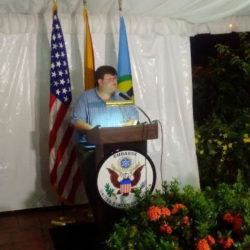Outgoing Deputy Chief of Mission of the United States Embassy, Bryan Hunt says that for Guyana to have holistic development it needs to move away from race voting, winner- takes-all-politics and have secure futuristic plans for monies garnered from oil.
“The choices that are made today and the actions that are taken will determine which trajectory Guyana follows,” Hunt said at a farewell reception held in his honour by U.S. Ambassador Perry Holloway, last evening at the Ambassador’s residence.
Guests at the reception included Prime Minister Moses Nagamootoo, members of parliament from both sides of the house and the private sector among others.

Having lived and worked in two oil-producing countries in Africa: Angola and Botswana, Hunt compared how the proceeds from oil could destroy or build a country. He urged that Guyana’s citizenry choose a path where revenue gained from future oil production be put to develop the country holistically.
“Over the next decade revenues from the petroleum sector will transform this country and this society. The amount of money that will flow into state coffers will be unprecedented and the quantities that we are talking about far exceed the comprehension of most Guyanese even those at the highest echelon of government,” he posited.
Further, he added “Make no mistake that a transformation will occur. The question is whether it will be one that models Angola where resources have reinforced all the worst elements of a divided society and led to decades of underdevelopment and civil conflict or one that models Botswana where resources have led to substantially improved socio- economic development and strong democratic institutions”.
Hunt pointed out that he had much to say, even as he leaves these shores for his next appointment in Mozambique, as he has always been very vocal on social issues that affect the country. He offered advice for both the leaders and populace.
“Repair the division within Guyanese society. Whether you want to define them as racial, ethnic or political there is no question that yours is a divided society. Regardless of who sits in central government, about half of the population feels completely excluded. This has to change,” he said.
He told the nation’s leaders that bringing about that change requires going beyond conferences and workshops on social cohesion. “Significant constitutional reform is essential. Power must be decentralized, the winner-takes-all system must be abolished. Communities must be given greater political control at the local level. Those who lose elections, whether in the past or present or future, need to accept their defeat and relinquish power gracefully rather than railing against the system,” he stressed.
“Remember that parliament ultimately belongs to the people not the political parties. Party interest must be subservient to national interest,” he added.
He believes that a concerted effort must be made to stamp out corruption in whatever form it occurs, saying that anyone who stole or attempts to steal state resources must be criminally charged and held accountable before a court of law.
The U.S. envoy noted that conflict of interest legislation and enforceable asset disclosure requirements should be established here with urgency. “Beyond that, all political parties must adopt a zero tolerance policy for their officials and elected representatives. We need to see parties holding their own accountable rather than defending or overlooking bad behaviour,” Hunt stated
Offering recommendations, Hunt said that state asset management reform must occur. He reiterated the need for the public procurement commission and regular forensic audits of all state entities. The deficiencies discovered in the recent audits should be corrected immediately.
He said that civil society and the media must be empowered though greater transparency in government’s financial decision making.
Turning his attention to violence against women and children, the American diplomat stressed the need for perpetrators to be charged and added that the system must be so set up that it will be unacceptable for those found guilty to hold political office. Said Hunt “Violence against women and children must not only be criminally prosecuted but must become socially and politically unacceptable”.
He also suggested that anti-discrimination legislation be expanded to protect the human rights of the lesbian, gay, bisexual and transgender community and that social attitudes must changes to embrace all peoples as equal.





